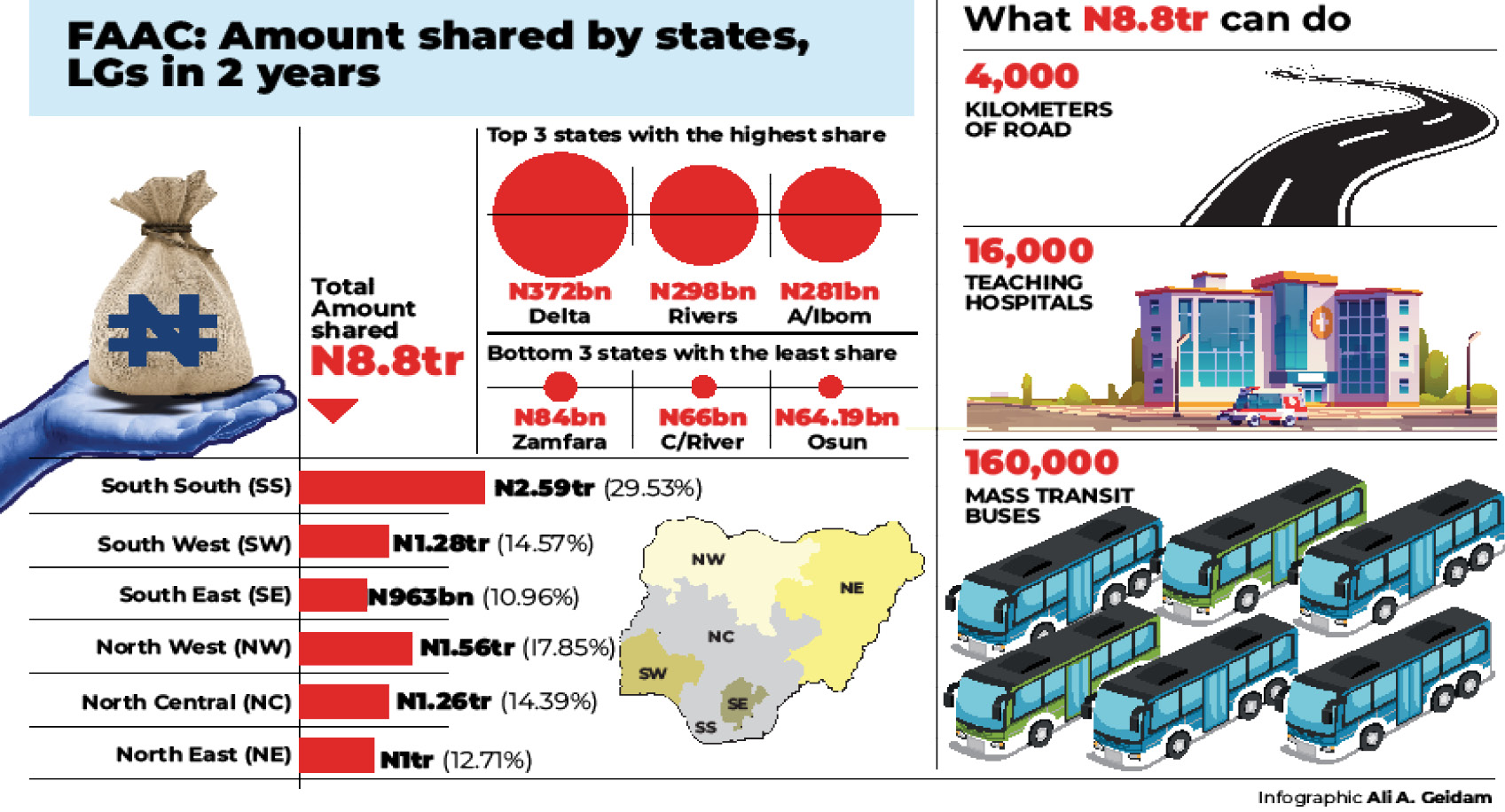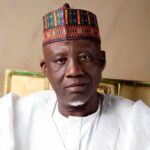Amidst the prevalent poverty rate in Nigeria, 36 states, including the FCT and 774 local governments received a total of N8.8 trillion as allocation from the Federal Accounts Allocation Committee (FAAC) from 2020 to 2021, a report by the Nigeria Extractive Industries Transparency Initiative (NEITI) has shown.
The National Bureau of Statistics had, in its National Multidimensional Poverty Index report, disclosed that 133 million Nigerians are multi-dimensionally poor.
The NBS said 63 per cent of Nigerians were poor due to a lack of access to health, education, living standards, employment and security.
The NBS report showed Sokoto, Bayelsa, Gombe, Jigawa, and Plateau were the top five poorest states in 2022.
Tinubu’s intervention in Akeredolu, deputy’s feud a window dressing – PDP
Tinubu’s govt neglecting us, North Central politicians cry out
They were closely followed by Yobe, Kebbi, Taraba, Ebonyi and Zamfara.
There have been reports of lack of basic amenities and development projects at the state and the local government levels.
An analysis of the Fiscal Allocation and Disbursements Audit (FASD) report of the NEITI showed that the revenue shared included income gross statutory allocations, value added tax and 13 per cent derivation for mineral-producing states.
A breakdown of the report shows that in terms of geo-political zone allocations, the South-South received the highest allocation with N2.59 trillion, which represents 29.53 per cent of the total revenue disbursed to states and local governments.
The rationale behind higher allocation by states was as a result of the 13 per cent derivation revenue allocated exclusively to nine oil-producing states of which five are from the South-South geopolitical zone.
The report shows that the North-West got N1.56 trillion, representing 7.85 per cent; South West, N1.28 trillion, representing 14.57 per cent; North-Central, N1.26 trillion, representing 14.39 per cent and North-East, N1 trillion, representing 12.71 per cent for the period under review.
The South-East had the lowest allocation of N963 billion or 10.96 per cent of the total allocation.
States with lion share
The report also indicated that Delta and Rivers states received the lion share of the FAAC allocation for being the largest oil producing states. Delta received N372.07 billion followed by Rivers, N298.68 billion and Akwa Ibom, N281.78 billion.
Cross River State had the least allocation of N66.83 billion during the period under review.
In the North West, Kano State received the highest allocation of N163.41 billion followed by Kaduna, N130.02 billion and Katsina, N123.09 billion; while Zamfara got the least allocation of N84.81 billion.
What N8.8trn can do
Although Daily Trust assumes that the N8.8 trillion released to the federal, states and LGAs covered both capital and recurrent expenditures, there have been reports of lack of basic amenities and development projects in states and the local level.
Daily Trust’s findings showed that the N8.8 trillion shared in two years could build about 16,000 teaching hospitals and 4,000 kilometres of roads across the 36 states of the federation and the FCT as well as the 774 local government’s councils and purchase 160,000 coaster buses.
A standard teaching hospital in Nigeria is estimated to cost an average N500 million, Daily Trust understands.
A construction engineer, Abdullahi Musa, who spoke to Daily Trust, said the amount was lesser before the hike in the cost of construction materials, like cement, iron, among others.
Musa said “On the average, N500 million should build a teaching hospital to a standard level in Nigeria. Before now, when cement and other items were cheaper, we could even do it at N400 million but as you know everything is now high,” he said.
The World Bank estimated that a kilometre of road cost between $300,000 and $500,000 anywhere in the world.
This means that the current amount in Naira is about N500 million. However, several government projects have quoted a kilometre of road to be around N2 billion.
As such, with N2 billion per kilometre of road, about 4,000 kilometres could be constructed with the said amount across the federating units.
Also, as the effect of subsidy removal bites harder, more states have resorted to buying mass transit buses to ease workers transportation.
If all the states and local governments are to buy mass transit buses (Coaster) with that amount, it will purchase about 160,000 buses, which is estimated to cost about N50 million each, according to an online survey on Toyota websites.
This implies that each of the 774 local governments could have up to 206 mass transit buses.
CSOs flay leaders’ failure, demand accountability
Executive Director, Resource Centre for Human Rights and Civic Education (CHRICED), Dr Ibrahim Zikirullahi, said that the NEITI report is yet another disheartening reminder of the failure of the political elite at all levels of governance.
“They have milked the country so badly that instead of development, extreme poverty and misery has been on the teeming people of this country. Who will bell the car and rescue the country from this haemorrhage? Nigerians must organise to ensure public resources bring development to the long suffering people of this country,” Zikirullahi said.
On her part, the immediate past Country Director of ActionAid Nigeria (AAN) and Convener of the Situation Room, Ms Ene Obi, said that this has to do with transparency and accountability.
“The states are being used as machinery for looting. If you are talking about the sharing formula, where are the details, why can’t this be made so plain and public? There are many states that their governors are living outside the states in Abuja and running the affairs of the states here instead of being at their states.
“Where is the accountability when those who looted in the past. Who did not pay workers’ salaries for years and are even in other elected and appointed positions. There are many Nigerians who served the country meritoriously and for over one year have not received their gratuity not to talk of pension; whereas, the governors and others who are supposed to facilitate these payments paid themselves even before they leave the office,” Obi said.
Also, Executive Director of the African Centre for Leadership, Strategy and Development (Centre LSD), Dr Otive Igbuzor, said for government revenue to be translated into tangible goals and services, there must be improved transparency, accountability and responsibility at all levels.
“And the way to do it in four dimensions is by ensuring that all procuring agencies across the level have internal mechanisms and procedures to ensure financial integrity; secondly, the legislators at all levels must do their oversight effectively,” he said.
“In fact, most of the failures in revenue translated into services can be attributed to the failure of the legislature; thirdly independent bodies like the ICPC, EFCC must be active. It is so bad many of the states in Nigeria don’t talk about anti-corruption at all, despite the problem of corruption and when they talk about corruption, it is that the EFCC wants to arrest their officials and they are saying no.
“Fourthly, the media, CSOs and the general citizens must hold government at all levels accountable, by getting interested in the budget; get the budget, track the projects within the budget, including looking at the cost and reasons for the project and cost.
“Recently a state government commissioned a 10 kilometre road, tagged at N30bn and there was no outrage, meaning N3bn per kilometre?” Igbuzor added.

 Join Daily Trust WhatsApp Community For Quick Access To News and Happenings Around You.
Join Daily Trust WhatsApp Community For Quick Access To News and Happenings Around You.


